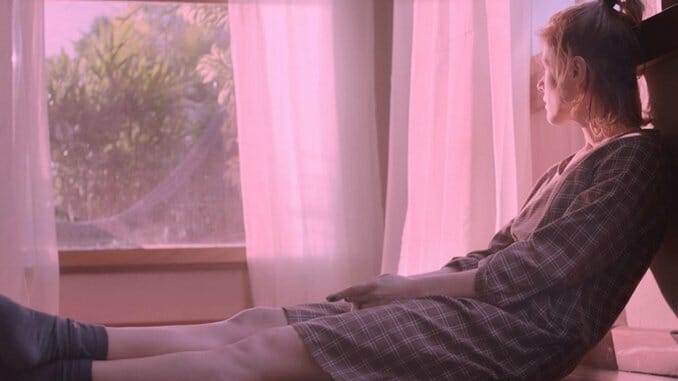The Pink Cloud Captures the Confines of Traditional Femininity
(Sundance 2021)

Brazilian director Iuli Gerbase’s sci-fi-tinged feature debut presents a version of the apocalypse that will be inevitably referenced as an example of “pandemic cinema.” This is chiefly due to the film’s premise of a toxic pink cloud forcing citizens around the globe to hunker down indoors for an indeterminate (and seemingly infinite) period of time, coincidentally mirroring our current COVID crisis.
Essentially no more than strangers when the pink cloud appears over their Brazilian city, Giovana (Renata de Lélis) and Yago (Eduardo Mendonça) are compelled to foster a domestic relationship in order to combat the loneliness of being separated from friends and family. As their relationship progresses (or, more aptly, as the cloud-induced quarantine persists), Giovana and Yago begin to discuss their stances on conventional relationship trajectories. A palpable rift appears when Giovana reveals that she does not want to have a child, emphasizing that it would be cruel to raise one in such cramped quarters, never able to experience the beauty of the natural world if the cloud were to endure.
Perhaps predictably, Giovana’s hard stance on motherhood turns out to be more malleable than she previously thought. While pregnancy, birth and newfound parenthood is presented as an exciting adventure within the boundaries of the new normal, she begins to retreat from her role as a wife, mother and caretaker, instead opting for the manufactured freedom of the virtual realm, where responsibilities and social pressures are non-existent.
It’s impressive (and downright uncanny) that a film written in 2017 and shot in 2019 accurately predicts so many of the specific sensations of living under quarantine: the sudden abundance of elastic waistbands, an immediate dependence on resources being delivered through a monolithic mail-order system, the stray thought of “what will happen to homeless people?” puncturing the bubble of an otherwise mundane conversation. Yet the film captures more than the oppressive boredom and listlessness that an extended quarantine entails, as the cloud itself makes a striking allegory for the imposition of traditional tenets of femininity in conventional heterosexual relationships.
-

-

-

-

-

-

-

-

-

-

-

-

-

-

-

-

-

-

-

-

-

-

-

-

-

-

-

-

-

-

-

-

-

-

-

-

-

-

-

-








































